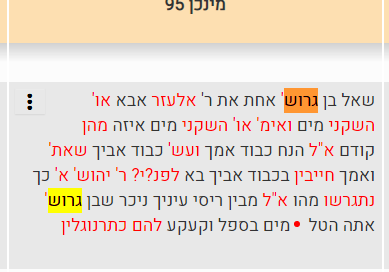The Ambiguous Orphan
In yesterday’s daf, Kiddushin 31a, an orphan asked about who precedes whom for kibbud av va’em, a mother or a father.
שָׁאַל בֶּן אַלְמָנָה אַחַת אֶת רַבִּי אֱלִיעֶזֶר: אַבָּא אוֹמֵר: ״הַשְׁקֵינִי מַיִם״ וְאִימָּא אוֹמֶרֶת: ״הַשְׁקֵינִי מַיִם״, אֵיזֶה מֵהֶם קוֹדֵם? אֲמַר לֵיהּ: הַנַּח כְּבוֹד אִמְּךָ וַעֲשֵׂה כְּבוֹד אָבִיךָ, שֶׁאַתָּה וְאִמְּךָ חַיָּיבִים בִּכְבוֹד אָבִיךָ. בָּא לִפְנֵי רַבִּי יְהוֹשֻׁעַ, אָמַר לוֹ כָּךְ.
The son of one widow asked Rabbi Eliezer: If my father says to me: Give me water to drink, and my mother also says to me: Give me water to drink, which of them should I honor first? Rabbi Eliezer said to him: Set aside the honor of your mother, and perform the honor of your father, as you and your mother are both obligated in the honor of your father. He came before Rabbi Yehoshua and asked him the same question, and Rabbi Yehoshua said this same answer to him.
אָמַר לוֹ: רַבִּי, נִתְגָּרְשָׁה מַהוּ? אֲמַר לֵיהּ: מִבֵּין רִיסֵי עֵינֶיךָ נִיכָּר שֶׁבֶּן אַלְמָנָה אַתָּה. הַטֵּל לָהֶן מַיִם בְּסֵפֶל וְקַעְקֵעַ לָהֶן כְּתַרְנְגוֹלִין.
The man said to him: My teacher, if one’s mother is divorced, what is the halakha? Rabbi Yehoshua said to him: From your eyelashes, which are filled with tears, it is evident that you are the son of a widow, and you have no father. Why, then, are you asking this question as though it were relevant for you? Consequently, Rabbi Yehoshua answered him sarcastically: Pour water for them into a pitcher and squawk at them as one does to summon chickens. In other words, if one’s mother is divorced, the same honor is due to both parents, and neither takes precedence.
He is introduced as a ben almana, thus an orphan who still has his mother, yet he asks the question. After hearing that the father takes precedence, he asks about a case of divorce. To this, Rabbi Yehoshua notices his countenance, says he realizes that he is an orphan and gives a sarcastic answer. I suppose the orphan from his father was gauging how much he was missing out on.
Rashi explains:
שבן אלמנה אתה - ולא צריך אתה למעשה אלא ללמוד באת ואני אומר לך שכבוד שניהם שוה עליך:
That you are the son of a widow And that you do not need [my answer] in practice. Rather you have come to learn, and I tell you that the honor of both of them is the same upon you.
I am reminded about a story regarding Rav Soloveitchik, that in terms of hilchot Shabbat, a student wanted to know the practical halacha as it pertained to diapering a baby. He brought in a doll and a diaper. Rav Soloveitchik asked if the student was married (and thus had a kid). The student said no, so the Rav said that when he had a baby, then he could ask.
Another possibility in this gemara is that this was not actually the son of an almana, but actually the son of a gerusha, divorcee, in which case his question was indeed pertinent. If we look at Hacho Garsinan, this is the girsa that Munich 95 has:
If so, Rabbi Yehoshua is not answering sarcastically, and we’d have to reinterpret his comment. Basically, he sees that the student is directly impacted, and tells him not to engage in fights between his father and mother. Just put the water out before both of them and let them hash it out.
I also found the Guadalajara printing fascinating. Almana begins with an aleph, and so does isha. Its version is:
It continues with the person asking about the gerusha case, and Rabbi Yehoshua surmising that he was a ben almana:
The impact of beginning with the ben isha is to preserve the ambiguity until the big reveal. Unless it is just a scribal error for two aleph words.








